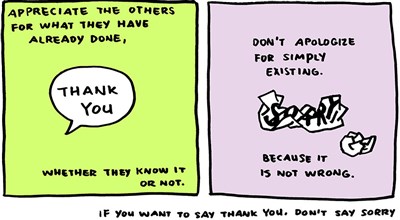
SENA KAYASÜ (ARCH/IV)
sena.kayasu@ug.bilkent.edu.tr
“The holiday season”—as it’s known across the Atlantic—is a pretty stressful time for Bilkenters. The fall term comes to a close, and we all have to pay the piper in advance for our upcoming holiday. And now even that is over. Hurray!
I admit that I get overwhelmed by the weight of life’s problems quite easily. It hasn’t helped that this is my final year and I have no idea where I’ll be or what I’ll be doing next holiday season. But this week I’ve come across a project that helped me dig my feet into the ground and stand up: “If You Want to Say Thank You, Don’t Say Sorry.”
The title refers to a series of cartoon drawings by graphic artist Yao Xiao. They illustrate the effect of saying “thank you” when most people choose to say “sorry [for bothering you].” For example, when a friend of yours arrives late to meet you, out of breath, and automatically apologizes, “Sorry, I’m always late,” you’re likely to think, “Yes, you are,” and feel a little annoyed at the person for not taking the appointment seriously, as if it’s a statement about you or an expression of general disrespect toward you. Since I am often the one who’s late, I can readily say that this is not the case, but when the first word to come out of your mouth is “sorry,” you inadvertently create the impression that something is wrong, even though it usually isn’t. Yes, your friend was unpunctual, but what if she had said “Thank you for your patience” instead? You would feel appreciated and would be assured that everything was okay. Being late isn’t the end of the world, after all.
They say about machines that the output is a direct result of the input: they produce what they are told. Humans are something like machines in the sense that they respond to incoming data. If you provide positive input, they will (usually) respond positively, and if you give them negative input, they will be likely to react negatively. Apologizing constantly makes you as well the person across from you feel bad.
All of this is not meant to be used for manipulation. We do not have the right to become unconcerned about our little faux pas because of this. If a wrong has been done, apologize. Now. This prescription is for when you apologize when you haven’t done anything wrong, when no one was hurt, when you were not being thoughtless or inconsiderate. Like when you’re not feeling at your best and bad things are happening and you talk to a friend about it, and then say, “Sorry, I’m kind of a drag.” You’re not a drag. Bad things happens to everyone, and it’s your right to share them and it’s your friend’s responsibility to listen. When you say “sorry,” you feel bad about [supposedly] boring your friend and he [at least a little] feels like he wasted his time listening to you. What would have happened if you’d said “Thank you for spending time with me” or “Thank you for understanding me”?
If you want to say “Thank you for listening,” don’t say “Sorry, I’m just rambling.” If you want to say “Thank you for appreciating me,” don’t say “Sorry I take up so much space.” If you want to say “Thank you for having hope in me this whole time,” never, ever say “Sorry I’m such a disappointment.”
I’m a movie nut, so—of course—I have a motion picture to connect this to. “Happythankyoumoreplease” is a small budget film that’s about the strength of character it takes to love and be loved. It has an entire scene about expressions of gratitude. Although I’m usually biased against movies that were written and directed by their lead actor (in this case, Josh Radnor, or Ted from “How I Met Your Mother”), this one’s pretty good.
